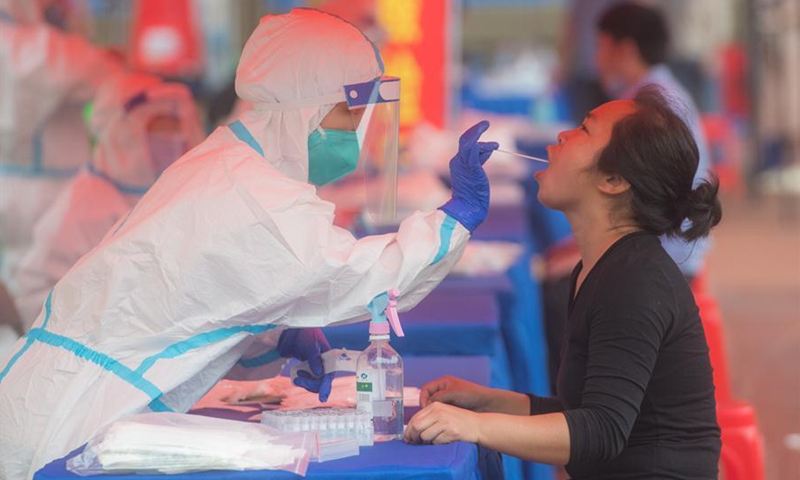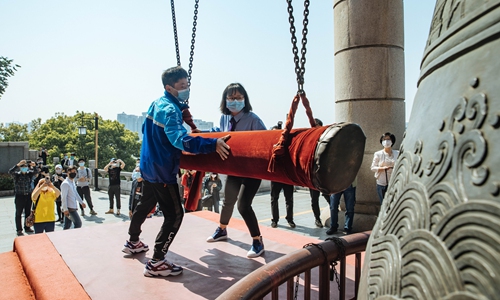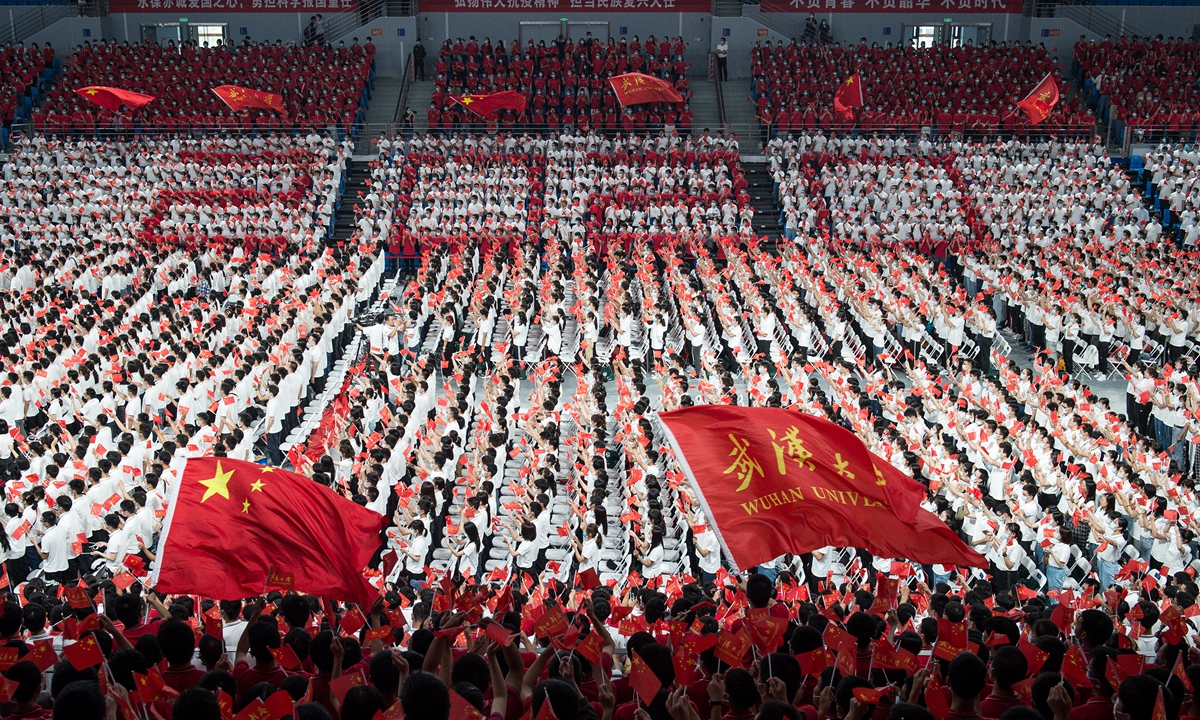Today's China the most convincing response to Western COVID suspicions

A resident takes the nucleic acid test at a testing post set up at a primary school in Dongxihu District in Wuhan, central China's Hubei Province, May 15, 2020. Wuhan will arrange nucleic acid tests for all residents who have not been tested before, in order to better know the number of asymptomatic cases of the novel coronavirus. The decision was made as the virus-ravaged city continued to report daily increases of asymptomatic infections, which raised concerns among the public. (Xinhua/Xiao Yijiu)
No matter how successfully China has contained the spread of the coronavirus with all-out efforts and how the country has passed on its experiences of handling the epidemic to the world in a timely manner, some Western media has not given up its longstanding prejudices and ideological biases when looking back at the past year, after American broadcaster CNN came up with a so-called classified file on Tuesday in an attempt to sensationalize obsolete issues and mislead the world again.
CNN promoted on Tuesday a special report that disclosed alleged flaws in China's epidemic response, as the date marked "one year since the first known patient showed symptoms of the disease" in Wuhan, capital of Central China's Hubei Province.
By referring to the so-called leaked internal official documents, the report, like some other Western media outlets in the early days of the outbreak in Wuhan that published stories criticizing the "gross mistakes and governance failures" of Chinese authorities, has not provided new arguments to defy China's coronavirus response. Akin to previous doubts by the West over the true numbers of infected people, death tolls and inaccurate testing, the CNN report claims to shed light on similar issues again, even though Chinese authorities, leading epidemiologists who took part in the anti-epidemic battle and local officials have fully clarified those questions.
When the Global Times talked with a number of leading Chinese epidemiologists who took part in the early stages of the anti-epidemic fight, they shared the consensus that there is no need to respond to such suspicions from the West, as all the questions have already been answered. The most convincing response is today's China, where people enjoy pool parties and have seen normal life return with an economic recovery that has rekindled the hope for a post-COVID-19 world.

In a symbol of good luck, two people clang the bell at Wendesday's reopening ceremony of Huanghelou, or Yellow Crane Tower, a Wuhan landmark which had been closed for 98 days due to the coronavirus. The tourist spot has put measures in place to control crowds and ensure visitor safety. Photo: Li Hao/GT
Disguise the truth?
A major argument CNN used in its latest story to question the authenticity of infection numbers was over the 5,918 new cases on February 10, citing the so-called leaked document, which was not consistent with the numbers officially revealed. However, like many countries facing an unknown disease and lacking an adequate testing mechanism in the early days, China overcame the limited testing capacity in the early stages of the outbreak. This has been fully explained in publicly available official documents and by frontline doctors.
In February, Hubei Province changed the criteria to count confirmed diagnoses of the virus. Previously, only patients who had received positive results from a laboratory test were included in the publicly reported case counts. Confirmed cases thereafter were based on clinical diagnosis, including the use of CT scans.
Tong Zhaohui, chief physician of the respiratory and critical medicine department at Beijing Chaoyang Hospital, also an expert on the central government's steering group in Wuhan, told the Global Times that the change meant doctors were better able to judge the disease and improve treatment, as there were many cases which were showing onset of COVID-19 symptoms, even though they were not given a nucleic acid test.
In April, the city of Wuhan revised its COVID-19 death toll after it compared and corrected data from the city's nucleic acid testing system, which reflects the Chinese government's spirit to seek the truth from facts, experts said.
Wang Guangfa, a respiratory expert at Peking University First Hospital, who went to Wuhan at the beginning of the outbreak, told the Global Times that the authenticity of this so-called confidential document obtained by CNN is yet to be confirmed. But China's achievement in containing the virus speaks for itself, because if the situation was worse at the beginning than had been reported, how did China contain the outbreak in such a short time?
"For sure China made detours and struggled at the very beginning, because it is a brand-new virus which takes time to know, and China's resources lag behind those of the developed countries, such as Europe and the US," he said.
However, those detours and struggles did not prevent China from becoming a real model for the rest of the world in face of a new infectious disease, especially when it took China only one week to isolate the pathogen after the outbreak and making some major scientific discoveries such as identifying gene sequences, as well as determining latency and transmission routes. Those steps are seen as major contributions to the world in the epidemic prevention and control effort.

A total of 7,242 freshmen attend the opening ceremony at Wuhan University, in Central China's Hubei Province on Saturday, nine months after the city was hit hard by the novel coronavirus. Photo: IC
More misinterpretations
In addition to those obsolete questions that some Western media are now using to smear China's efforts to contain the epidemic, including Chinese people's huge sacrifices during the Hubei and Wuhan lockdowns, more suspicious voices have cast a shadow over scientific calls for global cooperation to identify the source of the coronavirus - another matter that has been highly politicized by some Western politicians in their anti-China campaign.
Wu Zunyou, a leading expert with the Chinese Center for Disease Control and Prevention (China CDC), pointed out that if Wuhan had not been locked down, the number of infected people in China would have reached nearly 2 million by the end of February. That decision prevented 1.5 to 2 million people from being infected and avoided the deaths of at least 60, 000 people.
British newspaper the Guardian ran a story on Sunday titled "A year after Wuhan alarm, China seeks to change COVID origin story," which interpreted the latest efforts to fend off the risks of another outbreak triggered by imported frozen food packaging as a "propaganda campaign" that leans toward possible alternative origins. Some media considered the latest research paper released then revoked by a team from the Chinese Academy of Sciences, which suggested the virus likely originated in India earlier than the outbreak in Wuhan, as a way of "shifting the blame."
However, amid a slew of hypotheses and studies that have been released that are attempting to answer the complex scientific question about where and how the novel coronavirus emerged, the Global Times found on Tuesday this study was withdrawn from the preprint platform of the medical journal The Lancet.
Some experts admitted that tracking the virus origin around the world is a complicated scientific question that is hard to answer. In particular, as the issue itself has been politicized, it will become even harder.
Zeng Guang, chief epidemiologist of the China CDC, told the Global Times in an earlier interview that the study provides the public with another perspective regarding the virus origin. Prior to the CAS findings, a study by the National Cancer Institute of Milan found the novel coronavirus in blood samples collected in October 2019, and previous research led by the University of Barcelona showed the presence of the virus in samples of sewage in Barcelona in March 2019.
Instead of trying to change the narrative on the epidemic, China has been calling for joint efforts by the international community to track the origin of the virus, share information and fight the coronavirus together.
China is the first to invite WHO experts to cooperate on tracing the origin, Chinese Foreign Ministry spokesperson Zhao Lijian said at a recent press conference. He called for all relevant countries to adopt a positive attitude and cooperate with the WHO as China does.
Deep self-reflection
When the CNN report referred to the so-called China's slow response and missteps by citing the document, it pointed the finger at the country's different political system again by depicting the problem as politically motivated with an ideological bias. However, it did not consider that Chinese public opinion has already had a deep reflection on the matter by reexamining the country's top-down emergency response mechanism by fixing loopholes.
Since the outbreak, some senior officials in Hubei were fired following a series of problems that came to light, as it is a consensus for the public that some golden moments were missed to save as many lives as possible at the early stage.
Meanwhile, in the wake of the COVID-19 outbreak, health institutes in China are committed to refining their health systems, such as enhancing surveillance and warning systems for contagious diseases and improving the quality of medical staff, which will prepare China's health system for possible future epidemics, according to the country's social and economic development plans for the next five years.
As the first country to contain the virus and resume production and social activities, China offered its epidemic control experiences to the world, and while some foreign academics urged the Trump administration to copy them, Washington failed to take note.
"In front of the unknown virus, everyone has been cautiously moving forward without knowing what is in front of them," a Chinese netizen said, noting that it is unreasonable for the US media to pinpoint the flaws of China without taking account of its experience.
If such an unknown virus swept over humanity again, experts do not know if any country could do better than China today. "It's unnecessary to respond to those suspicions anymore, the reality also speaks for itself," a Wuhan-based preeminent expert on COVID-19 told the Global Times on the condition of anonymity.